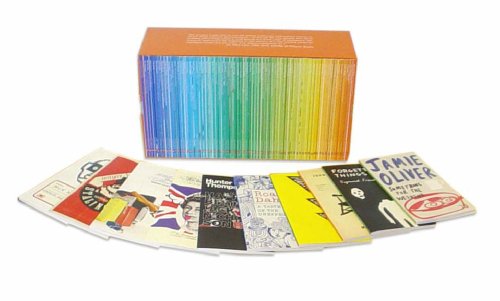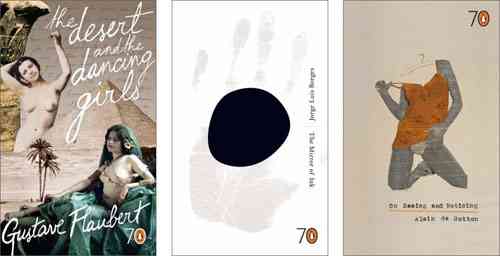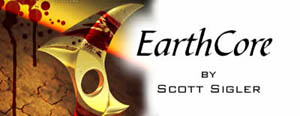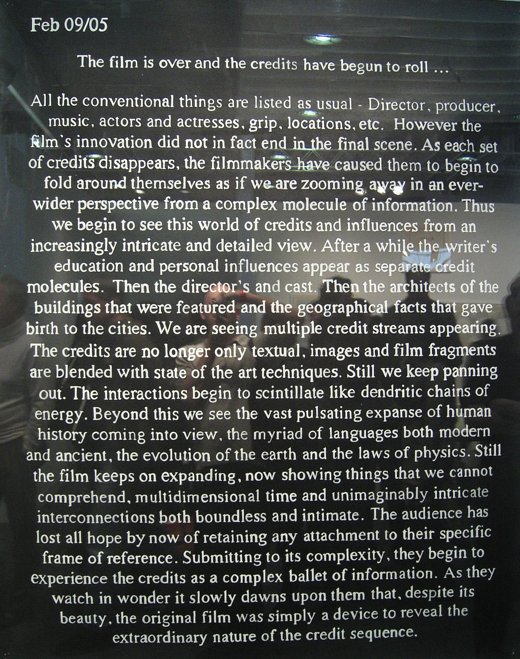i’ve been without an internet connection for a few days. was catching up on if:book posts and finding myself delighted by the wonderful range of interesting posts my colleagues had managed in just a few days. which made me want to send a note to lots of friends and acquaintances urging them to check out our blog. but then my more nervous, modest side took over and convinced me that urging people to sample a blog as wide-ranging as if:book is a dicey proposition since sampling one day’s posts doesn’t necessarily indicate the extent of our interests. the structure of blogs favors the chronology of entry; thematic categories are listed on the side but without much fanfare. wonder if we could re-arrange the “front page” to be more magazine like, where for example “recent posts” would be one feature among many.
Author Archives: bob stein
media consumption #2
While browsing bookstores in london yesterday — still one of my most favorite pastimes — i came across a beautiful box of 70 thin-spined pocketbooks, the colors of the spine intentionally creating a stunning run of the spectrum from blue to orange. turns out it is a series of 70 essays and short fiction celebrating Penguin’s 70th anniversary and its claim to have initiated the ‘paperback revolution.’ [note: legendary editor jason epstein claims to have done this for Doubleday. does anyone have any insight into whether either claimant really has bragging rights?].

Although i wanted to spring for the whole box, the $125 price tag was too daunting so i bought 3 of the slim volumes — “The Desert and the Dancing Girls,”, a travelogue by Gustave Flaubert describing his journey to Egypt; On Seeing and Noticing,” a collection of philosopher Alain de Botton’s short essays, and “The Mirror of Ink,” seven of Jorge Luis Borge’s wonderful short stories. the cover of each volume is exquisitely and thoughtfully designed, each by a different artist.

Each title is so beautiful in its own right, Penguin has succeeded in putting together a series which underlines the appeal of books as objects. the success of the series stems less from the elegance of the graphic design than from the decision to “go small.” none of the books in the series exceeds 60 pages; given the size of the page and the font, they are probably equivalent to a long piece in the New Yorker or the chapter of a book. had Penguin decided to celebrate their birthday with 70 beautifully designed books i would have wanted to own the objects but wouldn’t necessarily expect to read any of them. however, the curatorial intelligence behind this series seems to have come up with a concept which is “just right.” there is something about the discrete boundaries of these short volumes which makes me think i could read them and that i want to read them, not just own them. the closest analogy is to a box of deliciously appetizing chocolates where i browse the contents over and over, making decsions about which to eat first and which to save for later.
Sad to say i can’t even imagine writing the above to describe offerings in the digital domain. we may get there, but the terms will be different.
(media consumption #1)
the future of the institute
lately i’ve been thinking about how the institute for the future of the book should be experimental in form as well as content – an organization whose work, when appropriate, is carried out in real time in a relatively public forum. one of the key themes of our first year has been the way a network adds value to an enterprise, whether that be a thought experiment, an attempt to create a collective memory, a curated archive of best practices, or a blog that gathers and processes the world around it. i sense we are feeling our way to new methods of organizing work and distributing the results, and i want to figure out ways to make that aspect of our effort more transparent, more available to the world. this probably calls for a reevaluation of (or a re-acquaintance with) our idea of what an institute actually is, or should be.
the university-based institute arose in the age of print. scholars gathering together to make headway in a particular area of inquiry wrote papers, edited journals, held symposia and printed books of the proceedings. if books are what humans have used to move big ideas around, institutes arose to focus attention on particular big ideas and to distribute the result of that attention, mostly via print. now, as the medium shifts from printed page to networked screen, the organization and methods of “institutes” will change as well.
how they will change is what we hope to find out, and in some small way, influence. so over the next year or so we’ll be trying out a variety of different approaches to presenting our work, and new ways of facilitating debate and discussion. hopefully, we’ll draw some of you in along the way.
here’s a first try. we’ve decided (see thinking out loud) to initiate a weekly discussion at the institute where we read a book (or article or….) and then have a no-holds discussion about it — hoping to at least begin to understand some of the first order questions about what we are doing and how it fits into our perspectives on society. mostly we’re hoping to get to a place where we are regularly asking these questions in our work (whether designing software, studying the web, holding a symposium, or encouraging new publishing projects), measuring technological developments against a sense of what kind of society we’d like to live in and how a particular technology might help or hinder our getting there.
the first discussion is focused on neil postman’s “Building a Bridge to the 18th Century.” following is the audio we recorded broken into annotated chapters. we would be interested in getting people’s feedback on both form and content. (jump to the discussion)
thinking out loud
on sunday one of my colleagues, kim white, posted a short essay on if:book, Losing America, which eloquently stated her horror at realizing how far america has slipped from its oft-stated ideals of equality and justice. as kim said “I thought America (even under the current administration) had something to do with being civilized, humane and fair. I don’t anymore.”
kim ended her piece with a parenthetical statement:
(The above has nothing and everything to do with the future of the book.)
the four of us met around a table in the institute’s new williamsburg digs yesterday and discussed why we thought kim’s statement did or didn’t belong on if:book. the result — a resounding YES.
if you’ve been reading if:book for awhile you’ve probably encountered the phrase, “we use the word book to refer to the vehicle humans use to move big ideas around society.” of course many, if not most books are about entertainment or personal improvement, but still the most important social role of books (and their close dead-tree cousins, newspapers, magazines etc.) has been to enable a conversation across space and time about the crucial issues facing society.
we realize that for the institute to make a difference we need to be asking more the right questions.although our blog covers a wide-range of technical developments relating to the evolution of communication as it goes digital, we’ve tried hard not to be simple cheerleaders for gee-whiz technology. the acid-test is not whether something is “cool” but whether and in what ways it might change the human condition.
which is why kim’s post seems so pertinent. for us it was a wake-up call reinforcing our notion that what we do exists in a social, not a technological context. what good will it be if we come up with nifty new technology for communication if the context for the communication is increasingly divorced from a caring and just social contract. Kim’s post made us realize that we have been underemphasizing the social context of our work.
as we discuss the implications of all this, we’ll try as much as possible to make these discussions “public” and to invite everyone to think it through with us.
copyright 101
Richard Lanham, the godfather of electronic text, has written a wonderful piece in Academic Commons calling for a course in copyright for all undergraduates. Lanham, a UCLA English professor who has had a significant second career as an expert witness in copyright cases, gives one of the more cogent summaries of the copyright morass we find ourselves in as the digital tide overwhelms previous notions of property and ownership.
earthcore: a serial novel in podcasts
 in june i decided to explore the podcast phenomenon. i downloaded a number of different programs on to my ipod shuffle. the first batch included some favorite radio programs that i rarely listen to now that i hardly ever drive anywhere, a bunch of different audio blogs, some serious, some insane or inane . . . and the most interesting – Earthcore – billed as the first podcast only novel. written and performed by scott sigler, Earthcore is a science fiction page turner divided into tweny-one 40-50 minute installments. sigler has been releasing one installment per week. the last one just went up.
in june i decided to explore the podcast phenomenon. i downloaded a number of different programs on to my ipod shuffle. the first batch included some favorite radio programs that i rarely listen to now that i hardly ever drive anywhere, a bunch of different audio blogs, some serious, some insane or inane . . . and the most interesting – Earthcore – billed as the first podcast only novel. written and performed by scott sigler, Earthcore is a science fiction page turner divided into tweny-one 40-50 minute installments. sigler has been releasing one installment per week. the last one just went up.
 the plot is original and ingeniously woven and Sigler is one hell of a story teller. his palpable enthusiasm for his story, the Earthcore project and the new world of podcasting is infectious. just as in the best blogs, Earthcore seems to get an extra jolt from sigler’s willingness to put himself and his ideas on the line. his personality comes shining through; getting to know him and liking his attitude becomes an important part of the experience. with over 10,000 listeners by now, you would think that more than one major publisher would have come begging to buy the rights to a book with a significant proven audience. however, as if more proof of the moribund nature of big publishing were needed, to date not one publisher has approached Sigler. he’s on the verge of signing a deal with a small Canadian publisher, Dragon Moon Press. Congratulations to them for going with the opportunity.
the plot is original and ingeniously woven and Sigler is one hell of a story teller. his palpable enthusiasm for his story, the Earthcore project and the new world of podcasting is infectious. just as in the best blogs, Earthcore seems to get an extra jolt from sigler’s willingness to put himself and his ideas on the line. his personality comes shining through; getting to know him and liking his attitude becomes an important part of the experience. with over 10,000 listeners by now, you would think that more than one major publisher would have come begging to buy the rights to a book with a significant proven audience. however, as if more proof of the moribund nature of big publishing were needed, to date not one publisher has approached Sigler. he’s on the verge of signing a deal with a small Canadian publisher, Dragon Moon Press. Congratulations to them for going with the opportunity.
serendipity
the pinpoint accuracy of computer-searches, leaves those of us lucky enough to have spent time in library stacks, nostalgic for the unexpected discovery of something we didn’t know we were looking for but which just happened, serendipitously, to be on a nearby shelf. George Legrady, artist and prof at UC Santa Barbara, just showed a project he is working on for the new public library in Seattle that gave the first glimpse of serendipity in online library searching which lets you see all the books that have recently been checked out on a particular subject. Beautiful and Exciting.
Something is happening here but you don’t know what it is, do you, Mr. Jones?– me either for that matter.
 Came across this on a web-site i’d never heard of while searching for audio samples of a sound artist i’d never heard of (Todd Dockstader) that was referenced in a copy of magazine called The Wire that i purchased for the first time.
Came across this on a web-site i’d never heard of while searching for audio samples of a sound artist i’d never heard of (Todd Dockstader) that was referenced in a copy of magazine called The Wire that i purchased for the first time.
Stacked in almost innumerable dusty piles around my room are the incoming CDs of many a publicist’s hardwork & toil. And for reasons that have more to do with esoteric alignments of the stars than any particular dislike, they often remain untouched & unheard for far, far too long. This very column is somewhat of an attempt to remedy this situation while also commenting on the sheer volume of music, especially electronic music, that continues to be released. It’s a deluge of expression via our machines, which has resulted in an inverse response of criticism, a lack of perspective, an inability to perfect the zoom-out on the overall picture of what is being produced by this wired and wireless culture. . .
— tobias c. van veen in cut-up
reminded me for the 323rd time in the past several months that something profound is happening relative to the “sheer volume” of media being produced and new (online) distribution patterns. would love to start to understand the ramifications. here’s one i see in my own behavior — and you can’t imagine how painful it is to own up to this:
in 2001, 2 and 3 i made a scrapbook of things i collected on the web. i included in the scrapbook a record of all the books i read cover-to-cover. each year the number was at least 24. suddenly in 2004 the number went to ONE, and that was a graphic novel that i read in a few hours.
i’m still reading quite a bit but most of it is online and in much smaller chunks than books or even long articles. but also, with the advent of big notebook computers with dvd drives and large screens, some of my reading time has been supplanted by watching time as i’ve begun to absorb TV series (sopranos, 24, Six Feet Under) — viewing all the segments in as few sittings as possible, much like the experience of a page-turner novel.
i’m also browsing quite a bit more. when i was a teenager i went to the record store (yes, i’m that old) and would spend quite a long time choosing one or maybe two to buy. then i would bring those home and listen to them over and over and over. now i find i hardly ever have to come out of browsing mode. between othermusic.com, earplug, etc. etc. a scary amount of my conscious music listening can be subsumed by surfing for new sounds.
i’d like to find a way to get people to talk about their media consumption so that we can begin to understand what actually is happening, not just quantitatively, but qualitatively.
any suggestions?
(image by Gregory Vershbow)
the film is over and the credits have begun to roll
went to the armory show over the weekend. most conceptually interesting piece i saw was a large “poster” which described the credits to a film as an entry point to an ever-expanding chain of related information . . . basically suggesting that all knowledge can be linked in a semantic web to all other knowledge . . . theoretically the internet will develop to the point that this will be actually true instead of just conceptiually true. (emabarrassed to admit that in my excitement i didn’t get the name of the artist; if anyone recognizes the work, please tell us.)

institute for the future of the book field trip to the recent past
last night Printed Matter “the world’s greatest source for artists’ publications” threw open the doors to their storage space. my colleague, dan visel, and i couldn’t resist the opportunity to rummage through the bins for hidden treasures dating from the late 70s. 2 thoughts: we’re still a long way from the time when browsing an electronic archive will be anywhere near as pleasing, at least on the sensual plane; paper art may have hit it’s height in that moment with the arrival of desktop publishing and cheap xeroxing; now a lot of the energy that people were putting into the creation of paper art is likely going into e-artifacts and e-zines.
